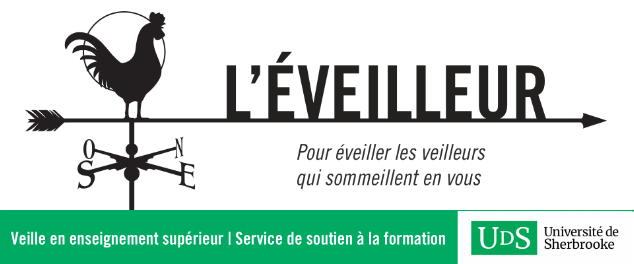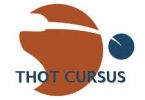Je me découvre une communauté d’esprit avec cette dame: Il s’agit de Cathy N. Davidson, co-fondatrice et professeure d’études interdisciplinaires du John Hope Franklin Humanities Institute et professeur d’anglais Ruth F. Devarney à l’Université Duke. Elle a également co-fondé le Humanities, Arts, Science and Technology Advanced Collaboratory (HASTAC), un réseau d’apprentissage collaboratif ouvert à tous. Elle a collaboré avec David Theo Goldberg au livre The Future of Thinking: Learning Institutions in a Digital Age à paraître en mars prochain (en attendant, un rapport préliminaire est disponible ici) [NDLR: Je l’ai fait imprimer, pour les intéressés]. Ses lunettes sont un peu roses, mais sa vision de l’enseignement rejoint beaucoup la mienne. Notamment, cette idée que nous passons d’un paradigme «d’autorité par l’expertise » vers un système « d’autorité par la popularité » et les difficultés que cela pose en enseignement. Elle aborde cette question dans une entrevue qu’elle donne au site Web Faith and Leadership de Duke:
« Now, instead of going to authorities, I am willing to trust the opinions of non-experts I don’t even know. That’s a different experience of human nature than we had before the Internet, before social networking. This is the world that we’re living in, and as educators we need to take that seriously. »
« …I’m not really worried about declining standards. People want a certain standard of excellence. It might be more the “American Idol” version of excellence where we’re not talking about pop singer versus the greatest opera singer in the world but about two pop singers. I am not an “American Idol” fan, incidentally, but it may turn out that the popular vote is not so different from the other vote. » [L’autre exmemple donné est celui des astronomes professionnels qui bénéficient de l’aide des astronomes amateurs.]
« How do we teach 11-year-olds what on Google is worth considering and what is nonsense? We’re good at learning from authority, but how do we learn to question authority? That’s a huge skill in a collaborative, Internet age. [mon emphase]
I don’t know any course, K through 20, that teaches you how to evaluate what counts as learning when you lack the specialized learning to make that evaluation. In other words, what is the process by which you think through credibility? On the Internet we know mobs are not always smart. Crowds are not always wise. How do you learn that? How do you teach kids that sense of “I’m skeptical here,” or “I want to get another point of view?” And how do you teach it not so they discount the ideas of others but so they know what is trustworthy so they can collaborate with others? [mon emphase] […]
On the Internet, you browse through lots of information and constantly synthesize that information into a generalization about the world. It is a complicated process and not everyone does it well or in the same way. No one teaches it. These are skills that we know are cognitively enhancing for both children and the elderly. » [mon emphase]
« One thing it means on the university level is that more of our classes have to try different learning models. They can’t all be students sitting in rows listening to one professor. More classes have to be lab-like in atmosphere. They have to be much more conversational. They have to focus more on students not just hearing one interpretation but aligning that interpretation against other interpretations.
I keep hearing that in this time of [financial] constraint there is going to be less team teaching. There needs to be more team teaching that is more multidisciplinary; instead of one expert addressing a problem, people with different points of view have to look at the problem. The problems that students deal with are in general far too complex for any one discipline or any one point of view. You have to give students the tools for synthesizing information. » [mon emphase]
Elle est également passionnante à écouter dans Digital Relearning, une vidéo de 6 min 23 réalisée par son université.







Super intéressant. Google appuie ses algorithmes de classement des sites sur la popularité. Comme peu de gens consultent au-delà de la première page de résultats, cela occasionne cercle vicieux puisque les sites découverts sur la première page de google sont plus susceptibles d’augmenter leur popularité. La citation : nous passons d’un paradigme «d’autorité par l’expertise » vers un système « d’autorité par la popularité » est très éloquente quant à l’importance de rehausser les compétences informationnelles.
La lecture de cet article m’a confortée dans l’approche que je cherche à développer pour rendre le plagiat moins attrayant. En effet, dans l’atelier que Catherine et moi avons donné (Pour en finir avec le plagiat), nous avons favorisé la remise en question des pratiques de formation sous l’effet de deux facteurs fortement liés : l’accessibilité sans précédent de l’information grâce au numérique et les caractéristiques de la nouvelle génération (Digital Born). Sans nier l’importance de bien reconnaître ses sources, nous avons beaucoup abordé la nécessisté de tenir compte du numérique et des comportements et valeurs de cette génération née avec les TICs. Nous avons longuement discuté des compétences informationnelles et rédactionnelles, tout comme nous avons parlé du travail collaboratif, du partage d’information, de l’élargissement du lectorat des travaux produits… Enfin, nous avons nous aussi abordé le changement de paradigmes en formation, que j’ai traduit comme ceci : nous passons de l’ère du QUOI (objet : parler ou faire parler de quelque chose) à a l’ère du Qui (sujet : qui en a parlé).
Nous ferons connaître Cathy Davidson aux particpants de l’atelier sur le plagiat.